Books That Deserve To Be Read
There are more than half a million books published each year in the US alone. Not all of them make the best seller lists. We are on a quest to find the books that deserve to be in the best seller list.
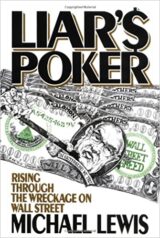
Liar’s Poker: Rising Through the Wreckage on Wall Street
In this shrewd and wickedly funny book, Michael Lewis describes an astonishing era and his own rake’s progress through a powerful investment bank. From an unlikely beginning (art history at Princeton?) he rose in two short years from Salomon Brothers trainee to Geek (the lowest form of life on the trading floor) to Big Swinging Dick, the most dangerous beast in the jungle, a bond salesman who could turn over millions of dollars’ worth of doubtful bonds with just one call.
With the eye and ear of a born storyteller, Michael Lewis shows us how things really worked on Wall Street. In the Salomon training program a roomful of aspirants is stunned speechless by the vitriolic profanity of the Human Piranha; out on the trading floor, bond traders throw telephones at the heads of underlings and Salomon chairman Gutfreund challenges his chief trader to a hand of liar’s poker for one million dollars; around the world in London, Tokyo, and New York, bright young men like Michael Lewis, connected by telephones and computer terminals, swap gross jokes and find retail buyers for the staggering debt of individual companies or whole countries.
The bond traders, wearing greed and ambition and badges of honor, might well have swaggered straight from the pages of Bonfire of the Vanities. But for all their outrageous behavior, they were in fact presiding over enormous changes in the world economy. Lewis’s job, simply described, was to transfer money, in the form of bonds, from those outside America who saved to those inside America who consumed. In doing so, he generated tens of millions of dollars for Salomon Brothers, and earned for himself a ringside seat on the greatest financial spectacle of the decade: the leveraging of America.
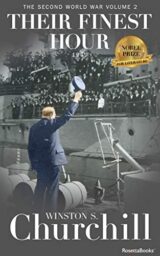
Their Finest Hour (Winston S. Churchill The Second World Wa Book 2)
In Their Finest Hour, Winston Churchill describes the invasion of France and a growing sense of dismay in Britain. Should Britain meet France’s desperate pleas for reinforcements or conserve their resources in preparation for the inevitable German assault? In the book’s second half, entitled simply “Alone,” Churchill discusses Great Britain’s position as the last stronghold against German conquest: the battle for control of the skies over Britain, diplomatic efforts to draw the United States into the war, and the spreading global conflict.
Their Finest Hour is part of the epic six-volume account of World War II told from the viewpoint of a man who led in the fight against tyranny, and enriched with extensive primary sources including memos, letters, orders, speeches, and telegrams, day-by-day accounts of reactions as the drama intensifies. Throughout these volumes, we listen as strategies and counterstrategies unfold in response to Hitler’s conquest of Europe, planned invasion of England, and assault on Russia, in a mesmerizing account of the crucial decisions made as the fate of the world hangs in the balance.

The Fish That Ate the Whale: The Life and Times of America’s Banana King
The fascinating, untold tale of Samuel Zemurray, the self-made banana mogul who went from penniless roadside banana peddler to kingmaker and capitalist revolutionary
When Samuel Zemurray arrived in America in 1891, he was tall, gangly, and penniless. When he died in the grandest house in New Orleans sixty-nine years later, he was among the richest, most powerful men in the world. Working his way up from a roadside fruit peddler to conquering the United Fruit Company, Zemurray became a symbol of the best and worst of the United States: proof that America is the land of opportunity, but also a classic example of the corporate pirate who treats foreign nations as the backdrop for his adventures.
Zemurray lived one of the great untold stories of the last hundred years. Starting with nothing but a cart of freckled bananas, he built a sprawling empire of banana cowboys, mercenary soldiers, Honduran peasants, CIA agents, and American statesmen. From hustling on the docks of New Orleans to overthrowing Central American governments and precipitating the bloody thirty-six-year Guatemalan civil war, the Banana Man lived a monumental and sometimes dastardly life. Rich Cohen’s brilliant historical profile The Fish That Ate the Whale unveils Zemurray as a hidden power broker, driven by an indomitable will to succeed.
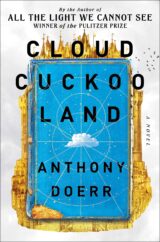
Cloud Cuckoo Land
Set in Constantinople in the fifteenth century, in a small town in present-day Idaho, and on an interstellar ship decades from now, Anthony Doerr’s gorgeous third novel is a triumph of imagination and compassion, a soaring story about children on the cusp of adulthood in worlds in peril, who find resilience, hope—and a book. In Cloud Cuckoo Land, Doerr has created a magnificent tapestry of times and places that reflects our vast interconnectedness—with other species, with each other, with those who lived before us, and with those who will be here after we’re gone.
Thirteen-year-old Anna, an orphan, lives inside the formidable walls of Constantinople in a house of women who make their living embroidering the robes of priests. Restless, insatiably curious, Anna learns to read, and in this ancient city, famous for its libraries, she finds a book, the story of Aethon, who longs to be turned into a bird so that he can fly to a utopian paradise in the sky. This she reads to her ailing sister as the walls of the only place she has known are bombarded in the great siege of Constantinople. Outside the walls is Omeir, a village boy, miles from home, conscripted with his beloved oxen into the invading army. His path and Anna’s will cross.
Five hundred years later, in a library in Idaho, octogenarian Zeno, who learned Greek as a prisoner of war, rehearses five children in a play adaptation of Aethon’s story, preserved against all odds through centuries. Tucked among the library shelves

To Rescue the Republic: Ulysses S. Grant, the Fragile Union, and the Crisis of 1876
An epic history spanning the battlegrounds of the Civil War and the violent turmoil of Reconstruction to the forgotten electoral crisis that nearly fractured a reunited nation, Bret Baier’s To Rescue the Republic dramatically reveals Ulysses S. Grant’s essential yet underappreciated role in preserving the United States during an unprecedented period of division.
Born a tanner’s son in rugged Ohio in 1822 and battle-tested by the Mexican American War, Grant met his destiny on the bloody fields of the Civil War. His daring and resolve as a general gained the attention of President Lincoln, then desperate for bold leadership. Lincoln appointed Grant as Lieutenant General of the Union Army in March 1864. Within a year, Grant’s forces had seized Richmond and forced Robert E. Lee to surrender.
Four years later, the reunified nation faced another leadership void after Lincoln’s assassination and an unworthy successor completed his term. Again, Grant answered the call. At stake once more was the future of the Union, for though the Southern states had been defeated, it remained to be seen if the former Confederacy could be reintegrated into the country—and if the Union could ensure the rights and welfare of African Americans in the South. Grant met the challenge by boldly advancing an agenda of Reconstruction and aggressively countering the Ku Klux Klan.
In his final weeks in the White House, however, Grant faced a crisis that threatened to undo his life’s work. The contested pres
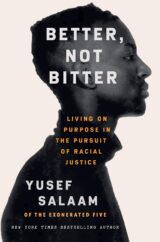
Better, Not Bitter: Living on Purpose in the Pursuit of Racial Justice
They didn’t know who they had.
So begins Yusef Salaam telling his story. No one’s life is the sum of the worst things that happened to them, and during Yusef Salaam’s seven years of wrongful incarceration as one of the Central Park Five, he grew from child to man, and gained a spiritual perspective on life. Yusef learned that we’re all “born on purpose, with a purpose.” Despite having confronted the racist heart of America while being “run over by the spiked wheels of injustice,” Yusef channeled his energy and pain into something positive, not just for himself but for other marginalized people and communities.
Better Not Bitter is the first time that one of the now Exonerated Five is telling his individual story, in his own words. Yusef writes his narrative: growing up Black in central Harlem in the ’80s, being raised by a strong, fierce mother and grandmother, his years of incarceration, his reentry, and exoneration. Yusef connects these stories to lessons and principles he learned that gave him the power to survive through the worst of life’s experiences. He inspires readers to accept their own path, to understand their own sense of purpose. With his intimate personal insights, Yusef unpacks the systems built and designed for profit and the oppression of Black and Brown people. He inspires readers to channel their fury into action, and through the spiritual, to turn that anger and trauma into a constructive force that lives alongside accountability and mobilizes change.
This memoir is an inspiring story that grew out of one of the gravest miscarriages of justice, one that not only speaks to a moment in time or the rage-filled present, but reflects a 400-year history of a nation’s inability to be held accountable for its sins. Yusef Salaam’s message is vital for our times, a motivating resource for enacting change. Better, Not Bitter has the power to soothe, inspire and transform. It is a galvanizing call to action.
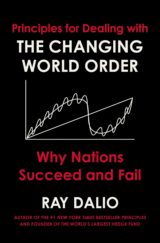
Principles for Dealing with the Changing World Order: Why Nations Succeed and Fail
A few years ago, Ray Dalio noticed a confluence of political and economic conditions he hadn’t encountered before. They included huge debts and zero or near-zero interest rates that led to massive printing of money in the world’s three major reserve currencies; big political and social conflicts within countries, especially the US, due to the largest wealth, political, and values disparities in more than 100 years; and the rising of a world power (China) to challenge the existing world power (US) and the existing world order. The last time that this confluence occurred was between 1930 and 1945. This realization sent Dalio on a search for the repeating patterns and cause/effect relationships underlying all major changes in wealth and power over the last 500 years.
In this remarkable and timely addition to his Principles series, Dalio brings readers along for his study of the major empires—including the Dutch, the British, and the American—putting into perspective the “Big Cycle” that has driven the successes and failures of all the world’s major countries throughout history. He reveals the timeless and universal forces behind these shifts and uses them to look into the future, offering practical principles for positioning oneself for what’s ahead.
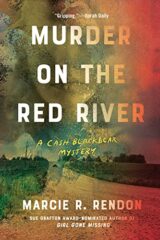
Murder on the Red River (A Cash Blackbear Mystery Book 1)
1970s, Red River Valley between North Dakota and Minnesota: Renee “Cash” Blackbear is 19 years old and tough as nails. She lives in Fargo, North Dakota, where she drives truck for local farmers, drinks beer, plays pool, and helps solve criminal investigations through the power of her visions. She has one friend, Sheriff Wheaton, her guardian, who helped her out of the broken foster care system.
One Saturday morning, Sheriff Wheaton is called to investigate a pile of rags in a field and finds the body of an Indian man. When Cash dreams about the dead man’s weathered house on the Red Lake Reservation, she knows that’s the place to start looking for answers. Together, Cash and Wheaton work to solve a murder that stretches across cultures in a rural community traumatized by racism, genocide, and oppression.
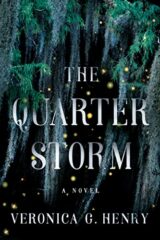
The Quarter Storm: A Novel (Mambo Reina)
Haitian-American Vodou priestess Mambo Reina Dumond runs a healing practice from her New Orleans home. Gifted with water magic since she was a child, Reina is devoted to the benevolent traditions of her ancestors.
After a ritual slaying in the French Quarter, police arrest a fellow vodouisant. Detective Roman Frost, Reina’s ex-boyfriend—a fierce nonbeliever—is eager to tie the crime, and half a dozen others, to the Vodou practitioners of New Orleans. Reina resolves to find the real killer and defend the Vodou practice and customs, but the motives behind the murder are deeper and darker than she imagines.
As Reina delves into the city’s shadows, she untangles more than just the truth behind a devious crime. It’s a conspiracy. As a killer wields dangerous magic to thwart Reina’s investigation, she must tap into the strength of her own power and faith to solve a mystery that threatens to destroy her entire way of life.

Breaking The Habit of Being Yourself: How to Lose Your Mind and Create a New One
You are not doomed by your genes and hardwired to be a certain way for the rest of your life. A new science is emerging that empowers all human beings to create the reality they choose. In Breaking the Habit of Being Yourself, renowned author, speaker, researcher, and chiropractor Dr. Joe Dispenza combines the fields of quantum physics, neuroscience, brain chemistry, biology, and genetics to show you what is truly possible.
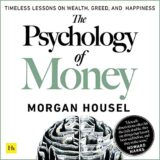
The Psychology of Money: Timeless Lessons on Wealth, Greed, and Happiness
Doing well with money isn’t necessarily about what you know. It’s about how you behave. And behavior is hard to teach, even to really smart people.
Money – investing, personal finance, and business decisions – is typically taught as a math-based field, where data and formulas tell us exactly what to do. But in the real world people don’t make financial decisions on a spreadsheet. They make them at the dinner table, or in a meeting room, where personal history, your own unique view of the world, ego, pride, marketing, and odd incentives are scrambled together.
In The Psychology of Money, award-winning author Morgan Housel shares 19 short stories exploring the strange ways people think about money and teaches you how to make better sense of one of life’s most important topics.
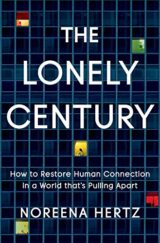
The Lonely Century: How to Restore Human Connection in a World That’s Pulling Apart
Loneliness has become the defining condition of the twenty-first century. It is damaging our health, our wealth, and our happiness and even threatening our democracy. Never has it been more pervasive or more widespread, but never has there been more that we can do about it.
Even before a global pandemic introduced us to terms like “social distancing,” the fabric of community was unraveling and our personal relationships were under threat. And technology isn’t the sole culprit. Equally to blame are the dismantling of civic institutions, the radical reorganization of the workplace, the mass migration to cities, and decades of neoliberal policies that have placed self-interest above the collective good.
This is not merely a mental health crisis. Loneliness increases our risk of heart disease, cancer, and dementia. Statistically, it’s as bad for our health as smoking fifteen cigarettes a day. It’s also an economic crisis, costing us billions annually. And it’s a political crisis, as feelings of marginalization fuel divisiveness and extremism around the world. But it’s also a crisis we have the power to solve.
Combining a decade of research with firsthand reporting, Noreena Hertz takes us from a “how to read a face” class at an Ivy League university to isolated remote workers in London during lockdown, from “renting a friend” in Manhattan to nursing home residents knitting bonnets for their robot caregivers in Japan.
Offering bold solutions ranging from compassionate AI to innovative models for urban living to new ways of reinvigorating our neighborhoods and reconciling our differences, The Lonely Century offers a hopeful and empowering vision for how to heal our fractured communities and restore connection in our lives.
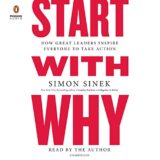
Start with Why: How Great Leaders Inspire Everyone to Take Action
The inspirational best seller that ignited a movement and asked us to find our why.
Discover the book that is captivating millions on TikTok and that served as the basis for one of the most popular TED Talks of all time – with more than 56 million views and counting. Over a decade ago, Simon Sinek started a movement that inspired millions to demand purpose at work, to ask what was the why of their organization. Since then, millions have been touched by the power of his ideas, and these ideas remain as relevant and timely as ever.
Start with Why asks (and answers) the questions: Why are some people and organizations more innovative, more influential, and more profitable than others? Why do some command greater loyalty from customers and employees alike? Even among the successful, why are so few able to repeat their success over and over?
People like Martin Luther King Jr., Steve Jobs, and the Wright Brothers had little in common, but they all started with why. They realized that people won’t truly buy into a product, service, movement, or idea until they understand the why behind it.
Start with Why shows that the leaders who have had the greatest influence in the world all think, act, and communicate the same way – and it’s the opposite of what everyone else does. Sinek calls this powerful idea The Golden Circle, and it provides a framework upon which organizations can be built, movements can be led, and people can be inspired. And it all starts with why.
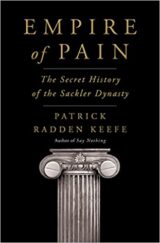
Empire of Pain: The Secret History of the Sackler Dynasty
The history of the Sackler dynasty is rife with drama—baroque personal lives; bitter disputes over estates; fistfights in boardrooms; glittering art collections; Machiavellian courtroom maneuvers; and the calculated use of money to burnish reputations and crush the less powerful. The Sackler name has adorned the walls of many storied institutions—Harvard, the Metropolitan Museum of Art, Oxford, the Louvre. They are one of the richest families in the world, known for their lavish donations to the arts and the sciences. The source of the family fortune was vague, however, until it emerged that the Sacklers were responsible for making and marketing a blockbuster painkiller that was the catalyst for the opioid crisis.
Empire of Pain begins with the story of three doctor brothers, Raymond, Mortimer and the incalculably energetic Arthur, who weathered the poverty of the Great Depression and appalling anti-Semitism. Working at a barbaric mental institution, Arthur saw a better way and conducted groundbreaking research into drug treatments. He also had a genius for marketing, especially for pharmaceuticals, and bought a small ad firm.
Arthur devised the marketing for Valium, and built the first great Sackler fortune. He purchased a drug manufacturer, Purdue Frederick, which would be run by Raymond and Mortimer. The brothers began collecting art, and wives, and grand residences in exotic locales. Their children and grandchildren grew up in luxury.
Forty years later, Raymond’s son Richard ran the family-owned Purdue. The template Arthur Sackler created to sell Valium—co-opting doctors, influencing the FDA, downplaying the drug’s addictiveness—was employed to launch a far more potent product: OxyContin. The drug went on to generate some thirty-five billion dollars in revenue, and to launch a public health crisis in which hundreds of thousands would die.
This is the saga of three generations of a single family and the mark they would leave on the world, a tale that moves f
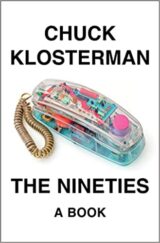
The Nineties: A Book
It was long ago, but not as long as it seems: The Berlin Wall fell and the Twin Towers collapsed. In between, one presidential election was allegedly decided by Ross Perot while another was plausibly decided by Ralph Nader. In the beginning, almost every name and address was listed in a phone book, and everyone answered their landlines because you didn’t know who it was. By the end, exposing someone’s address was an act of emotional violence, and nobody picked up their new cell phone if they didn’t know who it was. The 90s brought about a revolution in the human condition we’re still groping to understand. Happily, Chuck Klosterman is more than up to the job.
Beyond epiphenomena like “Cop Killer” and Titanic and Zima, there were wholesale shifts in how society was perceived: the rise of the internet, pre-9/11 politics, and the paradoxical belief that nothing was more humiliating than trying too hard. Pop culture accelerated without the aid of a machine that remembered everything, generating an odd comfort in never being certain about anything. On a 90’s Thursday night, more people watched any random episode of Seinfeld than the finale of Game of Thrones. But nobody thought that was important; if you missed it, you simply missed it. It was the last era that held to the idea of a true, hegemonic mainstream before it all began to fracture, whether you found a home in it or defined yourself against it.
In The Nineties, Chuck Klosterman makes a home in all of it: the film, the music, the sports, the TV, the politics, the changes regarding race and class and sexuality, the yin/yang of Oprah and Alan Greenspan. In perhaps no other book ever written would a sentence like, “The video for ‘Smells Like Teen Spirit’ was not more consequential than the reunification of Germany” make complete sense. Chuck Klosterman has written a multi-dimensional masterpiece, a work of synthesis so smart and delightful that future historians might well refer to this entire period as Klosterm
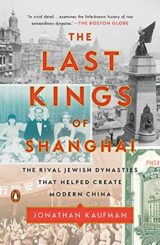
The Last Kings of Shanghai: The Rival Jewish Dynasties That Helped Create Modern China
Shanghai, 1936. The Cathay Hotel, located on the city’s famous waterfront, is one of the most glamorous in the world. Built by Victor Sassoon–billionaire playboy and scion of the Sassoon dynasty–the hotel hosts a who’s who of global celebrities: Noel Coward has written a draft of Private Lives in his suite and Charlie Chaplin has entertained his wife-to-be. And a few miles away, Mao and the nascent Communist Party have been plotting revolution.
By the 1930s, the Sassoons had been doing business in China for a century, rivaled in wealth and influence by only one other dynasty–the Kadoories. These two Jewish families, both originally from Baghdad, stood astride Chinese business and politics for more than 175 years, profiting from the Opium Wars; surviving Japanese occupation; courting Chiang Kai-shek; and losing nearly everything as the Communists swept into power. In The Last Kings of Shanghai, Jonathan Kaufman tells the remarkable history of how these families participated in an economic boom that opened China to the world, but remained blind to the country’s deep inequality and to the political turmoil at their doorsteps. In a story stretching from Baghdad to Hong Kong to Shanghai to London, Kaufman enters the lives and minds of these ambitious men and women to forge a tale of opium smuggling, family rivalry, political intrigue, and survival.
The book lays bare the moral compromises of the Kadoories and the Sassoons–and their exceptional foresight, success, and generosity. At the height of World War II, they joined together to rescue and protect eighteen thousand Jewish refugees fleeing Nazism. Though their stay in China started out as a business opportunity, the country became a home they were reluctant to leave, even on the eve of revolution. The lavish buildings they built and the booming businesses they nurtured continue to define Shanghai and Hong Kong to this day. As the United States confronts China’s rise, and China grapples with the pressures of brea
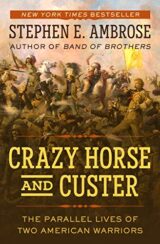
Crazy Horse and Custer: The Parallel Lives of Two American Warriors
On the sparkling morning of June 25, 1876, 611 men of the United States 7th Cavalry rode toward the banks of Little Bighorn in the Montana Territory, where three thousand Indians stood waiting for battle. The lives of two great warriors would soon be forever linked throughout history: Crazy Horse, leader of the Oglala Sioux, and General George Armstrong Custer. Both were men of aggression and supreme courage. Both became leaders in their societies at very early ages. Both were stripped of power, in disgrace, and worked to earn back the respect of their people. And to both of them, the unspoiled grandeur of the Great Plains of North America was an irresistible challenge. Their parallel lives would pave the way, in a manner unknown to either, for an inevitable clash between two nations fighting for possession of the open prairie.
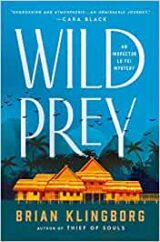
Wild Prey: An Inspector Lu Fei Mystery
“[A] taut thriller on a topical theme perfect for readers longing for an
au courant successor to Eliot Pattison’s Inspector Shan Tao Yun mysteries”
–Los Angeles TimesThe search for a missing girl sends Inspector Lu Fei
undercover into the wild corners of Myanmar, and the compound of the deadly
and mysterious woman warlord responsible for the illegal trafficking of
exotic animals and possibly more, in the next book from Brian Klingborg,
Wild Prey.Police Inspector Lu Fei has an unfortunate talent for getting
himself into hot water with powerful and well-connected people. Which is
why he’s been assigned to a backwater town in a rural area of Northern
China and quietly warned to keep his head down. But while running a sting
operation on the sale and consumption of rare and endangered animals, Lu
comes across the curious case of a waitress who has gone missing. Her last
known whereabouts: a restaurant frequented by local elites, owned by
smooth-talking gangster, and known for its exotic — and highly illegal —
delicacies. As usual, Lu’s investigation ruffles some feathers, resulting
in his suspension from the police force. Lu figures he’s reached a
dead-end. Then he’s contacted by a mysterious government official in
Beijing who wants him to go undercover to track down the mastermind behind
an illegal animal trafficking network — and hopefully, the answer to the
fate of the missing waitress. The mission will require Lu to travel deep
into the lawless wilds of Myanmar, where he will risk his life to
infiltrate the hidden compound of a mysterious and ruthless female warlord
in a bloody and nearly hopeless quest for justice. Read more

Straight Shooter: A Memoir of Second Chances and First Takes
America’s most popular sports media figure tells it like it is in this
surprisingly personal book, not only dishing out his signature, uninhibited
opinions but also revealing the challenges he overcame in childhood as well
as at ESPN, and who he really is when the cameras are off.Stephen A. Smith
has never been handed anything, nor was he an overnight success. Growing up
poor in Queens, the son of Caribbean immigrants and the youngest of six
children, he was a sports-obsessed kid who faced a number of struggles,
from undiagnosed dyslexia to getting enough cereal to fill his bowl. As a
basketball player at Winston-Salem State University, he got a glimmer of
his true calling when he wrote a newspaper column arguing for the
retirement of his own Hall of Fame coach, Clarence Gaines. Smith hustled
and rose up from a high school reporter at Daily News (New York) to a
general sports columnist at The Philadelphia Inquirer in the 1990s, before
getting his own show at ESPN in 2005. After he was unceremoniously fired
from the network in 2009, he became even more determined to fight for
success. He got himself rehired two years later and, with his razor-sharp
intelligence and fearless debate style, found his role on the show he was
destined to star in: First Take, the network’s flagship morning program. In
Straight Shooter, Smith writes about the greatest highs and deepest lows of
his life and career. He gives his thoughts on Skip Bayless, Ray Rice, Colin
Kaepernick, the New York Knicks, the Dallas Cowboys, and former President
Donald Trump. But he also pulls back the curtain and talks about life
beyond the set, sharing authentic stories about his negligent father, his
loving mother, being a father himself, his battle with life-threatening
COVID-19, and what he really thinks about politics and social issues. He
does it all with the same intelligence, humor, and charm that has made him
a household name. Provocative, moving, and eye-opening, this book is the
perfect gift for lovers of sports, television, and anyone who likes their
stories delivered straight to the heart. Read more
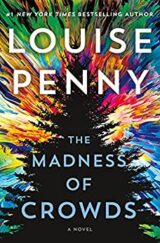
The Madness of Crowds: A Novel
Chief Inspector Armand Gamache returns to Three Pines in #1 New York Times bestseller Louise Penny’s latest spellbinding novel
You’re a coward.

Crazy Faith: It’s Only Crazy Until It Happens
Noah looked crazy when he started building the ark . . . until it started raining. It was crazy for Moses to lead a nation of people into the desert away from Egypt . . . until the Red Sea parted. It was crazy to believe that a fourteen-year-old virgin would give birth to the Son of God . . . until Mary held Jesus in her arms.
There are many things that seem normal or average today that at one point in time seemed absolutely crazy. Smartphones, Wi-Fi, and even the electric light bulb were all groundbreaking, history-making inventions that started out as crazy ideas. Our see-it-to-believe-it generation tends to have a hard time exercising true faith—one that steps out, takes action, and sees mountain-moving results. Many of us would rather play it safe and stand on the sidelines, but it’s crazy faith that helps us see God move and reveals His promises.
In Crazy Faith, Pastor Michael Todd shows us how to step out in faith and dive into the purposeful life of trusting God for the impossible. Even if you have to start with baby faith or maybe faith, you can become empowered to let go of your lazy faith, trust God through your hazy faith, and learn to live a lifestyle of crazy faith. With powerful stories of modern-day faith warriors who take their cues from biblical heroes, Michael Todd equips you to
• believe for the impossible
• choose hope over fear
• be alert to the voice of God
• cope with loss and doubt
• develop a deeper level of trust in God
• speak faith-filled dec
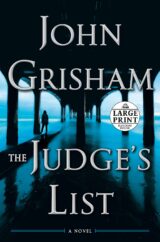
The Judge’s List: A Novel
In The Whistler, Lacy Stoltz investigated a corrupt judge who was taking millions in bribes from a crime syndicate. She put the criminals away, but only after being attacked and nearly killed. Three years later, and approaching forty, she is tired of her work for the Florida Board on Judicial Conduct and ready for a change.
Then she meets a mysterious woman who is so frightened she uses a number of aliases. Jeri Crosby’s father was murdered twenty years earlier in a case that remains unsolved and that has grown stone cold. But Jeri has a suspect whom she has become obsessed with and has stalked for two decades. Along the way, she has discovered other victims.
Suspicions are easy enough, but proof seems impossible. The man is brilliant, patient, and always one step ahead of law enforcement. He is the most cunning of all serial killers. He knows forensics, police procedure, and most important: he knows the law.
He is a judge, in Florida—under Lacy’s jurisdiction.
He has a list, with the names of his victims and targets, all unsuspecting people unlucky enough to have crossed his path and wronged him in some way. How can Lacy pursue him, without becoming the next name on his list?
The Judge’s List is by any measure John Grisham’s most surprising, chilling novel yet.
